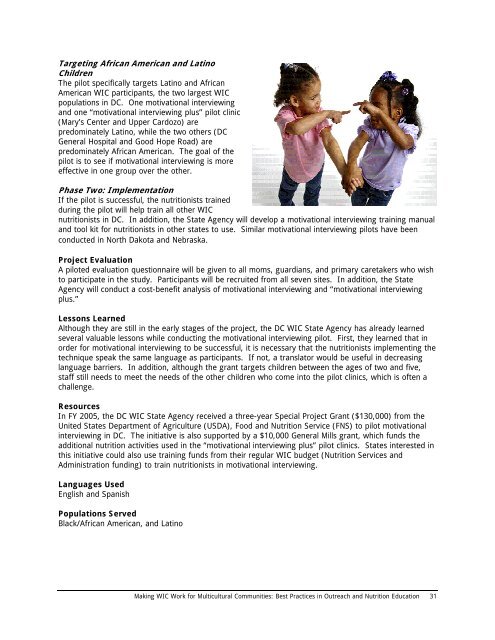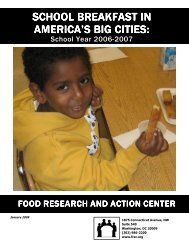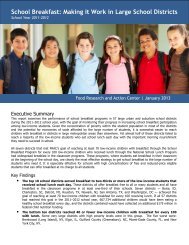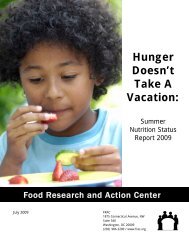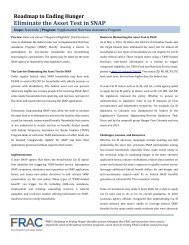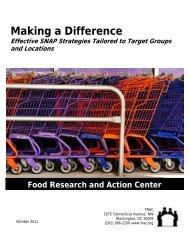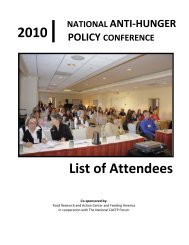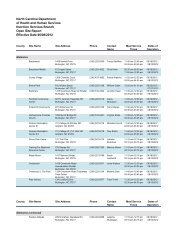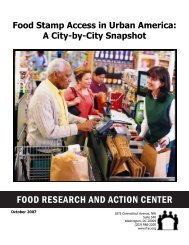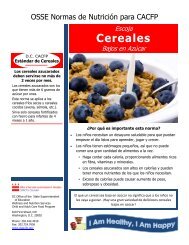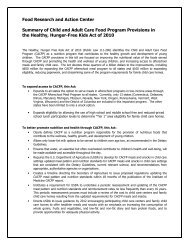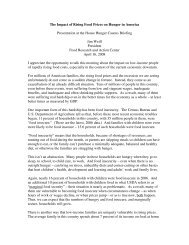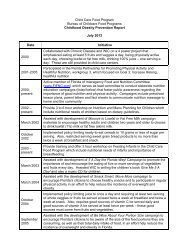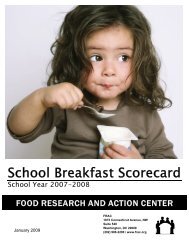Making WIC Work for Multicultural Communities - Food Research ...
Making WIC Work for Multicultural Communities - Food Research ...
Making WIC Work for Multicultural Communities - Food Research ...
You also want an ePaper? Increase the reach of your titles
YUMPU automatically turns print PDFs into web optimized ePapers that Google loves.
Targeting African American and Latino<br />
Children<br />
The pilot specifically targets Latino and African<br />
American <strong>WIC</strong> participants, the two largest <strong>WIC</strong><br />
populations in DC. One motivational interviewing<br />
and one “motivational interviewing plus” pilot clinic<br />
(Mary’s Center and Upper Cardozo) are<br />
predominately Latino, while the two others (DC<br />
General Hospital and Good Hope Road) are<br />
predominately African American. The goal of the<br />
pilot is to see if motivational interviewing is more<br />
effective in one group over the other.<br />
Phase Two: Implementation<br />
If the pilot is successful, the nutritionists trained<br />
during the pilot will help train all other <strong>WIC</strong><br />
nutritionists in DC. In addition, the State Agency will develop a motivational interviewing training manual<br />
and tool kit <strong>for</strong> nutritionists in other states to use. Similar motivational interviewing pilots have been<br />
conducted in North Dakota and Nebraska.<br />
Project Evaluation<br />
A piloted evaluation questionnaire will be given to all moms, guardians, and primary caretakers who wish<br />
to participate in the study. Participants will be recruited from all seven sites. In addition, the State<br />
Agency will conduct a cost-benefit analysis of motivational interviewing and “motivational interviewing<br />
plus.”<br />
Lessons Learned<br />
Although they are still in the early stages of the project, the DC <strong>WIC</strong> State Agency has already learned<br />
several valuable lessons while conducting the motivational interviewing pilot. First, they learned that in<br />
order <strong>for</strong> motivational interviewing to be successful, it is necessary that the nutritionists implementing the<br />
technique speak the same language as participants. If not, a translator would be useful in decreasing<br />
language barriers. In addition, although the grant targets children between the ages of two and five,<br />
staff still needs to meet the needs of the other children who come into the pilot clinics, which is often a<br />
challenge.<br />
Resources<br />
In FY 2005, the DC <strong>WIC</strong> State Agency received a three-year Special Project Grant ($130,000) from the<br />
United States Department of Agriculture (USDA), <strong>Food</strong> and Nutrition Service (FNS) to pilot motivational<br />
interviewing in DC. The initiative is also supported by a $10,000 General Mills grant, which funds the<br />
additional nutrition activities used in the “motivational interviewing plus” pilot clinics. States interested in<br />
this initiative could also use training funds from their regular <strong>WIC</strong> budget (Nutrition Services and<br />
Administration funding) to train nutritionists in motivational interviewing.<br />
Languages Used<br />
English and Spanish<br />
Populations Served<br />
Black/African American, and Latino<br />
<strong>Making</strong> <strong>WIC</strong> <strong>Work</strong> <strong>for</strong> <strong>Multicultural</strong> <strong>Communities</strong>: Best Practices in Outreach and Nutrition Education 31


